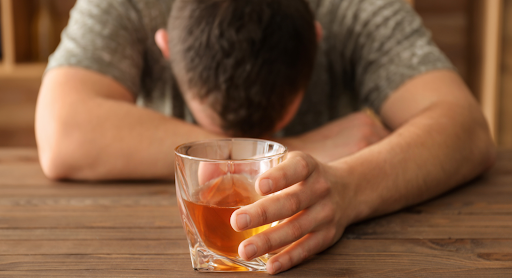Alcohol and Anxiety - Breaking The Cycle
- Sep 23, 2024
- 4 min read
Updated: Jun 12

With many individuals turning to alcohol for anxiety relief, the two can share a complex, often destructive relationship. Unfortunately, alcohol as a coping mechanism can quickly spiral into a vicious cycle, where excessive consumption creates more anxiety, leading to an increased desire to drink more.
Understanding the complex interplay between alcohol and anxiety is critical to addressing both issues and breaking free of their influence.
What is Anxiety?
Anxiety is a natural human response to stress that is beneficial in many situations. You can recognise anxiety as feelings of fear, dread, and uneasiness.
Physical symptoms you may feel alongside the emotional responses include sweating, restlessness, tension, and rapid heartbeat. Small doses of anxiety can help you stay alert and focused in demanding situations, motivate you to solve problems, and prepare you for challenging conditions.
In short, we all need a little anxiety because it helps us care about getting stuff done, like studying for an exam, going to work, or attending an important job interview. However, excessive, persistent anxiety disorders involving more intense and prolonged symptoms are often detrimental to your quality of life.
Anxiety Symptoms
Symptoms of anxiety vary wildly between individuals and generally include psychological and physical manifestations, including:
Persistent worry or fear
Difficulty concentrating
Irritability
Restlessness, trembling, and shaking
Rapid heart rate
Sweating
Nausea or stomach pain
Fatigue
Difficulty sleeping
Types of Anxiety Disorders
There are several different types of anxiety disorders, each with their own set of symptoms:
General Anxiety Disorder (GAD): Excessive, uncontrollable worry about everyday things such as health, money, work, and family.
Panic Disorder: Unexpected panic attacks that can occur at any time. Attacks involve periods of intense fear and feelings of impending doom, usually accompanied by physical symptoms such as heart palpitations and sweating.
Social Anxiety Disorder: People with social anxiety disorder have an intense fear of social situations where they feel they will be judged, humiliated, or embarrassed.
Relationship Between Alcohol and Anxiety
Alcohol abuse and anxiety are often closely linked, with both influencing the other. Understanding this complex relationship is the key to breaking free of alcohol dependence and improving your mental health.
Alcohol is a central nervous system depressant that affects the brain's neurotransmitters, which have critical roles in mood regulation.
Initially, alcohol has a calming influence on the neurotransmitters to provide temporary relief from anxiety symptoms. However, continued abuse leads to deficiencies, thereby increasing anxiety and tension. It's alcohol's initial calming influence that leads many people to turn to it as a coping mechanism during stressful situations.
The relief is short-lived, with the anxiety symptoms often returning in greater intensity once alcohol's effects have worn off. As alcohol's influences recede, more drinking is needed to restore a sense of calm, and the vicious cycle takes hold.
Chronic use of alcohol will have a detrimental effect on anxiety levels. Continued consumption leads to changes in brain chemistry, making it harder for the brain to manage stress and anxiety levels. Alcohol can also disrupt the amygdala, an area of the brain responsible for regulating emotions.
As alcohol becomes the dominant coping mechanism, it becomes increasingly difficult to quit drinking, as withdrawal symptoms can also trigger anxiety symptoms.
Breaking the Cycle
The road to recovery may be challenging, but the reward of a healthier lifestyle with valuable relationships is worth it. Here are a few habits to develop to help you on the road to recovery.
Recognise the Problem
The first step is to recognise and acknowledge you have a problem. You may not realise the extent of the hold alcohol has over stemming your anxiety or the effects it's having on your mental health.
Self-awareness and brutal honesty about your drinking habits are critical to taking the first steps towards positive change.
Seek Professional Help
Recovering from addiction on your own can be exhausting without help. Like climbing a mountain without equipment, you will eventually tire and stumble without help. Professional help provides a lifeline to support you over the tougher challenges, catch you when you slip, encourage you when you're tired, and offer strategies when you aren't sure which direction to take.
Support can take many forms, with community groups, recovery programs, and professional guidance offering valuable services during every stage of your recovery.
Build a Strong Support Network
In addition to being able to call on professional help in trying times, a robust support system of family members and friends will increase your chances of success. When you stumble, an understanding shoulder can prop you up and motivate you to keep going.
Learn Self-Help Strategies
Professional help can be a lifesaver for helping you break through obstacles, but helping yourself is also a significant part of managing anxiety. Mindfulness, meditation, and deep breathing exercises are all known for their ability to improve emotional regulation.
Engage in Physical Activity
Physical activity has played a role in stress management since our primitive ancestors. The modern lifestyle is not as active as it was during those ancient times, which means we need to hit the gym or pound the pavement to reduce stress and improve overall mental health.
Have a Plan
Breaking the cycle is a process; success requires a strategy and careful planning. A well-thought-out plan will include setting realistic goals, tracking progress, and adjusting as needed. Always celebrate victories, no matter how small, and be kind to yourself with patience and understanding. Setbacks will always occur, but with persistence and support, you will reach the next step in your journey.
Alcohol addiction stemming from anxiety relief is a heartbreaking outcome for all concerned. However, with the right help, support, and planning, every challenge to recovery and a healthy mental state is surmountable. Reset My Future is committed to helping you find the support and strategies unique to your situation. Book your free consultation to discuss with us today.







